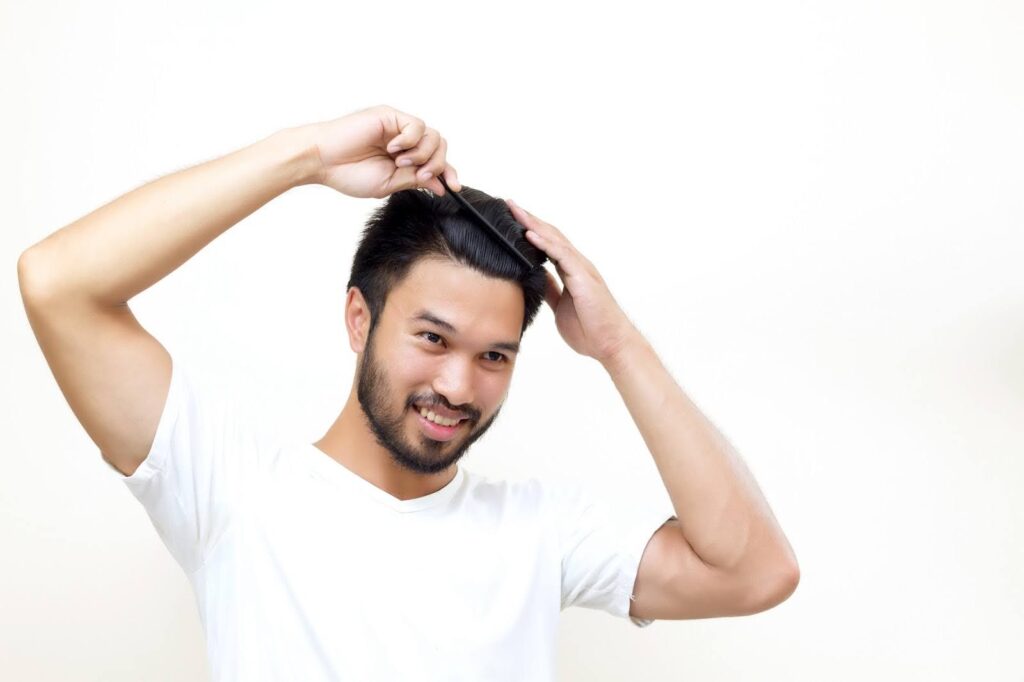Hair loss is not just annoying. To many men – and women – it can feel like an existential threat to see their hairline receding or to discover a growing bald spot on the back of their head.
As if it weren’t enough to have this new worry in our lives, we try to assign blame: Maybe we shouldn’t have worn a hat so often. Maybe we shouldn’t have used so much shampoo. Or maybe it was all our mother’s fault!
These are just some of the stubborn hair loss myths out there. If you’ve been losing your hair, there is almost certainly nothing you’ve been doing wrong. Before you go beating yourself up about what you think you may have done to cause your hair loss, read this list of debunked hair loss myths we’ve put together.
10 Hair Loss Myths
Myth #1: Wearing Hats Too Often Can Cause Hair to Fall Out
FALSE. The assumption here is that the scalp needs to “breathe” and that wearing hats can stifle that. Not true. Whatever oxygen your hair follicles need for growth is derived from the bloodstream, not the surrounding air.
Wear a hat all you want, it won’t cause your hair to fall out! Hats can come particularly handy to cover up thinning hair and bald spots on top of the head, maybe that’s why we associate them with hair loss. But wearing one will not speed up your hair loss or affect growth in any way.
Myth #2: All Hair Loss Is Permanent
FALSE. The typical cause of male hair loss, male pattern baldness, is a genetic condition that’s irreversible. But hair loss can also be caused by other factors, such as trauma, hormonal changes, eating disorders, or illness. Women can suffer from postpartum hair loss that rectifies itself around 6 months after giving birth.
Hair loss that is caused by something other than pattern baldness is most often only temporary.
Myth #3: Stress Is Causing Your Hair Loss
ONLY PARTIALLY TRUE. While everyday stress is not typically enough to cause hair loss all by itself, it is true that big traumatic events have been linked to hair loss—think long-term suffering and illness. According to the Mayo Clinic, such severe stress can cause your hair to go into a longer “resting phase” in which hair follicles pause to regenerate hair. It can also cause alopecia areata, a form of patchy hair loss.
Again, these types of hair loss are typically linked to severely traumatic events, not everyday stress like a demanding job, a nagging boss, or children who drive you crazy. And even so, the resulting hair loss, if any, is almost always temporary. So the last thing you should stress about is your level of stress!
Myth #4: Only Older People Suffer From Baldness
FALSE. If you have a family history of hair loss, you may see the first signs of losing your hair in your twenties. While the majority of men experience the onset of male pattern baldness in middle age, for up to a quarter of men the process will begin before they’re even 21 gamdom casino.
But that doesn’t mean you’ll notice it right away. Most hair loss can only be seen after half of the hair is gone!
Myth #5: Genetic Hair Loss Is Passed Down Through Your Mother’s Side of the Family
FALSE. We all like to blame our mothers for many things. Male pattern baldness, however, can be passed on by either one of your parents. Yes, genetics can be blamed, but don’t pin this one any more on your mother than you do on your father. And it’s not grandpa’s fault either!
Myth #6: Hair Loss Is Only a Problem for Men
FALSE. Women can and do suffer from hair loss. Some put the share of women among hair loss sufferers at 40%. However, women experience hair loss differently than men. Male pattern baldness typically starts at the top of the head with a receding hairline and continues until only a ring of hair is left around the back of the head.
Women do not typically have receding hairlines, but rather experience thinning hair more evenly across the entire scalp.
Myth #7: Bald Men Have More Testosterone
FALSE. It would be a comfort if baldness was good for something, like, say, an elevated sex drive. Perhaps that’s why this particular one of all the hair loss myths is so persistent. However, studies have shown that balding men have the same testosterone levels as their hairy brethren.
This doesn’t mean that hormones don’t play a role, however. They do, and studies have shown a hormone called DHT is to blame. Somehow having too much of it – caused by genetics – causes your follicles to eventually stop producing. Based on your genetic makeup, your hair follicles may be more or less sensitive to hormone levels.
Myth #8: Washing and Shampooing Your Hair Too Much Can Cause Hair Loss
FALSE. How often you wash and shampoo your hair has no effect on overall loss or growth of hair. You may simply notice the hair that is falling out more acutely while you’re in the shower washing it, but this is hair that would have fallen out anyway.
At any given time, a portion of our hair regenerates itself by falling out, going dormant for a while, and growing again. This is a normal cycle. When baldness sets in, hair that falls out can no longer be replaced because the hair follicles die off.
Myth #9: Taking Vitamins Will Promote Hair Growth
FALSE. Your hair is basically dead tissue. This means that taking vitamins or rubbing a vitamin-filled lotion onto your head does not affect hair growth in any way. Unfortunately, non-surgical hair loss treatments do not tend to work, and often can turn expensive fast when you add up all the repeat treatments.
Myth #10: Getting Your Hair Cut Often Will Make It Grow Back Thicker and Faster
FALSE. Haircuts have nothing to do with how fast or thick your hair grows. Whether you like to wear your hair short or let it grow out, the rate at which it renews itself has nothing to do with your hairstyle.
Whatever the reason for your receding hairline or growing bald spot, it isn’t likely to be something you can control. What you can control, however, is what you do about it. Get started by finding out more about modern medical hair replacement with a hair transplant. Or simply upload your hair pictures to request a FREE quote and start a virtual consultation.

